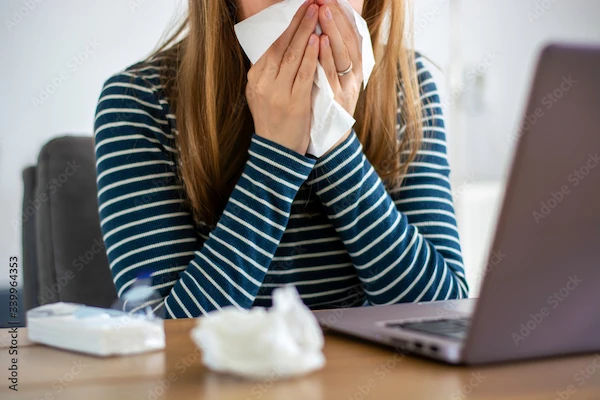How To Reduce Cough?
Discover effective ways to reduce cough naturally. Learn about home remedies, hydration tips, and when to seek medical help for lasting relief.

Written by Dr.Sonia Bhatt
Last updated on 3rd Jul, 2025

Introduction
Coughing is a common reflex that helps clear your throat and airways. While occasional coughing is normal, persistent or severe coughing can be uncomfortable and disruptive to daily life. Whether it’s due to a cold, allergies, or other underlying conditions, knowing how to reduce cough can help you feel better faster.
Understanding Cough: Types and Causes
A cough can be dry (no mucus) or productive (with mucus). Identifying the cause is the first step in finding relief. Common causes include:
Viral infections (cold, flu)
Allergies (dust, pollen, pet dander)
Acid reflux (GERD)
Asthma or bronchitis
Smoking or pollution exposure
Consult Top Doctors for Personalised Treatment Options
Effective Ways to Reduce Cough
Here are some proven methods that may help ease your cough and soothe your throat.
1.Stay Hydrated
Drinking warm liquids like herbal tea, warm water with honey, or broth helps soothe the throat and loosen mucus. Staying hydrated keeps your throat moist and reduces irritation.
2. Honey: A Natural Cough Suppressant
Honey has antibacterial and soothing properties. Mix 1-2 teaspoons of honey in warm water or herbal tea to relieve throat irritation and reduce coughing. Avoid giving honey to children under 1 year old.
3. Steam Inhalation
Inhaling steam helps loosen mucus and ease congestion. You can:
Take a hot shower and breathe in the steam.
Boil water, pour it into a bowl, and lean over it with a towel over your head (be careful to avoid burns).
4. Gargle with Salt Water
A saltwater gargle (½ teaspoon salt in warm water) can reduce throat irritation and kill bacteria. Gargle 2-3 times a day for relief.
5. Use a Humidifier
Dry air worsens coughing. A humidifier adds moisture to the air to prevent your throat and airways from drying out. This can help ease coughing, especially in dry environments.
6. Avoid Irritants
Reducing exposure to irritants can prevent your cough from worsening.
Smoke (tobacco or pollution) worsens coughing—avoid smoking and secondhand smoke.
Strong perfumes or cleaning chemicals can trigger coughing.
7. Over-the-Counter (OTC) Remedies
Some OTC products may provide temporary relief.
Use cough syrups—expectorants for mucus and suppressants for dry cough.
Suck on lozenges to help numb the throat and reduce irritation.
Always consult a doctor before using OTC medicines, especially for children or if you have other health conditions.
8. Elevate Your Head While Sleeping
If nighttime coughing is an issue, prop up your head with an extra pillow. This helps prevent postnasal drip from irritating your throat and causing a cough.
9. Try Herbal Remedies
Some herbal options may help calm your cough.
Ginger tea– Known for its soothing and anti-inflammatory effects.
Turmeric milk– May help soothe throat irritation.
Peppermint tea– Can relieve congestion and calm the airways.
10. Manage Acid Reflux (GERD)
If your cough is due to acid reflux:
Avoid spicy, fatty, or acidic foods.
Eat smaller, more frequent meals.
Avoid lying down immediately after eating.
When to See a Doctor
Most coughs improve within 1-2 weeks. However, consult a doctor if:
The cough lasts more than 3 weeks.
You have high fever, chest pain, or difficulty breathing.
You cough up blood or notice unexplained weight loss.
Preventing Future Coughs
You can reduce your risk of future coughing episodes by following these tips:
Wash hands frequently to avoid infections
Stay up-to-date with flu and pneumonia vaccines
Avoid close contact with unwell people
Quit smoking to improve lung health
If your cough persists or worsens, don’t hesitate to seek medical advice. You can book an online consultation with an Apollo doctor or schedule a lab test through Apollo 24|7 for a quick diagnosis.
Final Thoughts
Coughing can be bothersome, but with the right care, you can find relief. Simple home remedies, hydration, and avoiding irritants can make a big difference. If symptoms persist, professional medical advice is always the best step.
Consult Top General Physicians
Consult Top Doctors for Personalised Treatment Options

Dr. Md Yusuf Shareef
General Practitioner
8 Years • MBBS
Hyderabad
Apollo 24|7 Clinic, Hyderabad

Dr. D Bhanu Prakash
General Practitioner
10 Years • MBBS, AFIH, Advanced certificate in critical care medicine, Fellowship in critical care medicine
Hyderabad
Apollo 24|7 Clinic, Hyderabad

Dr Summaiya Banu
General Practitioner
8 Years • MBBS
Hyderabad
Apollo 24|7 Clinic, Hyderabad
(150+ Patients)

Dr. Shubham Chauhan
General Practitioner
4 Years • MBBS
Lucknow
Apollo 24|7 Clinic - Uttar Pradesh, Lucknow

Dr. Syed Yaseen Ahmed
General Practitioner
7 Years • MBBS
Hyderabad
Apollo 24|7 Clinic, Hyderabad
Consult Top General Physicians

Dr. Md Yusuf Shareef
General Practitioner
8 Years • MBBS
Hyderabad
Apollo 24|7 Clinic, Hyderabad

Dr. D Bhanu Prakash
General Practitioner
10 Years • MBBS, AFIH, Advanced certificate in critical care medicine, Fellowship in critical care medicine
Hyderabad
Apollo 24|7 Clinic, Hyderabad

Dr Summaiya Banu
General Practitioner
8 Years • MBBS
Hyderabad
Apollo 24|7 Clinic, Hyderabad
(150+ Patients)

Dr. Shubham Chauhan
General Practitioner
4 Years • MBBS
Lucknow
Apollo 24|7 Clinic - Uttar Pradesh, Lucknow

Dr. Syed Yaseen Ahmed
General Practitioner
7 Years • MBBS
Hyderabad
Apollo 24|7 Clinic, Hyderabad
